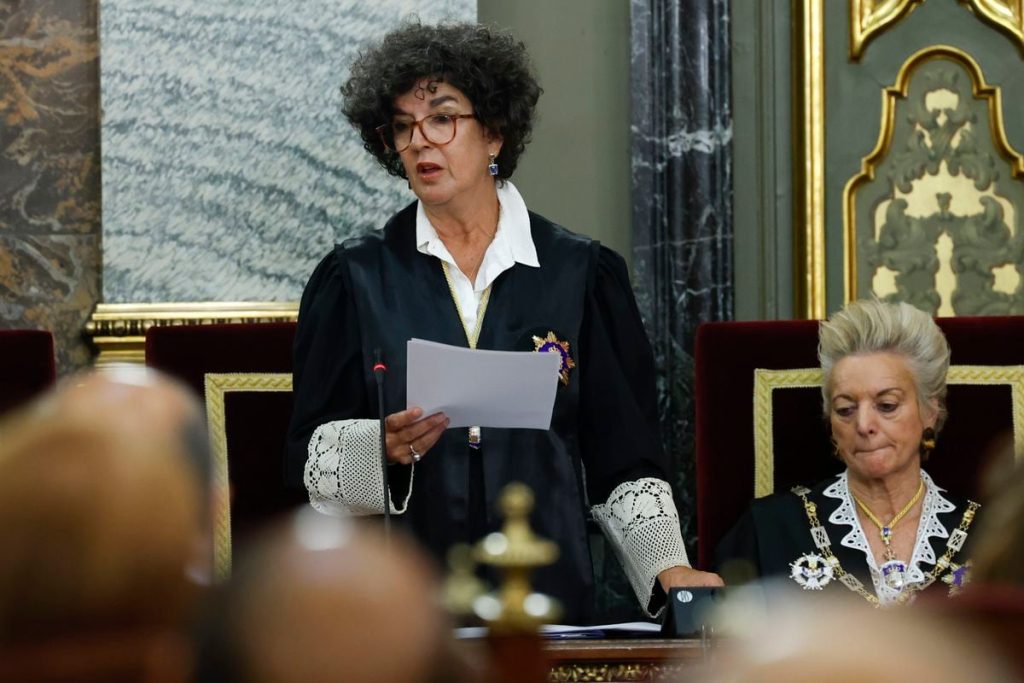The Meeting of the Departmental Prosecutors, the main advisory body of the Attorney General, is scheduled for Wednesday and is expected to be high voltage, placing pressure on Álvaro García Ortiz. The meeting was convened after the Madrid prosecutor investigating the complaint filed against the Prosecutor’s Office by Alberto González Amador, partner of Isabel Díaz Ayuso, opposed the order she received from the number two of the institution and deputy prosecutor of the Supreme Court, María Ángeles Sánchez Conde, to support the dismissal of that complaint. The prosecutor, María de la O Silva, requested activation of article 27 of the Organic Statute of the Public Prosecutor’s Office, which allows the case to be escalated to the board of prosecutors when an “improper” or “contrary to law” instruction is received from superiors.
The Board of Departmental Prosecutors is made up of the 36 prosecutors with this category, the highest in the prosecutorial career. It is chaired by the Attorney General, but García Ortiz will not be at the meeting on Wednesday because he recused himself from this case after taking “responsibility” for the press release issued by the Provincial Prosecutor’s Office of Madrid on March 14, which denied the information that Ayuso’s team was disseminating against the institution after an investigation was opened into her boyfriend for alleged tax offenses. The partner of Ayuso and the Madrid Bar Association (ICAM) took that statement to court as they believed it revealed confidential information from the investigation into González Amador.
The prosecutor handling the ICAM complaint recommended dismissing it; however, Prosecutor Silva, assigned the Ayuso couple’s complaint, believes there are indications of a crime and intends to carry out a series of inquiries, a position that has been rejected by the Supreme Court’s deputy prosecutor, who has instructed Silva to request the dismissal of the investigation. Silva’s refusal to comply with this order is what has led to the meeting taking place this Wednesday. The Prosecutor’s Office leadership will have to decide on the position to be taken regarding the complaint from the Ayuso couple, which is directed against the Madrid chief prosecutor, Pilar Rodríguez, and economic crimes prosecutor, Julián Salto. Different sources within the Public Prosecutor’s Office predict that the debate will be intense.
The majority of departmental prosecutors may see grounds to continue with the Ayuso couple’s complaint, but Sánchez Conde could choose to maintain her position and order the dismissal, knowing that she would have the majority of the prosecutorial leadership against her, intensifying the internal battle within the institution. The prosecutors will have access to documentation, including the confession sent by González Amador to the Prosecutor’s Office on February 2, in which the partner of the Madrid president admits to committing two tax offenses and details the penalty he is willing to accept to avoid imprisonment. He accepts “a prison sentence of four months for each offense to be imposed on Alberto González Amador.” In addition, he agrees to “lose the possibility of obtaining public subsidies or assistance and the right to enjoy tax or social security benefits or incentives for a period of 9 months.”
In conclusion, the meeting of the Departmental Prosecutors is of great significance as it deals with a high-profile case involving the Ayuso couple’s complaint against the Prosecutor’s Office, raising tensions within the institution. The outcome of the meeting will depend on the opinions and decisions of the prosecutors, including whether to continue the investigation or dismiss the complaint. The internal dynamics and divisions within the Prosecutor’s Office may play a crucial role in shaping the final decision. The case highlights the challenges faced by prosecutors in handling sensitive and complex legal matters while maintaining the integrity and independence of the institution. It remains to be seen how the Board of Departmental Prosecutors will navigate these challenges and reach a resolution in the best interests of justice.


